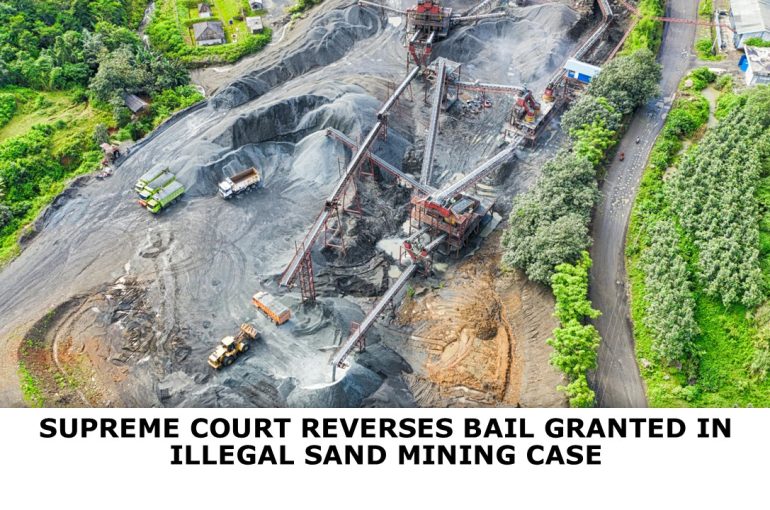SUPREME COURT REVERSES BAIL GRANTED IN ILLEGAL SAND MINING CASE
The Judgment in the Case of Union of India through the Assistant Director v. Kanhaiya Prasad (Criminal Appeal No. 728 of 2025) was delivered by a Division Bench of the Supreme Court of India, comprising Hon’ble Justice Bela M. Trivedi and Justice Prasanna B. Varale on February 12, 2025. This case primarily deals with illegal sand mining and money laundering under the Prevention of Money Laundering Act (PMLA), 2002.
Brief Facts of the Case
The Appellant, Enforcement Directorate (ED), filed an Appeal against the Order of Patna High Court dated May 06, 2024, which granted bail to Kanhaiya Prasad (Respondent) in Special Trial (PMLA) Case No. 8 of 2023. Multiple FIRs were lodged against M/s Broad Son Commodities Private Ltd and its Directors in Patna, Saran and Bhojpur districts under various IPC sections and the Bihar Mineral Rules, 2019, for engaging in illegal sand mining and sale , causing the government exchequer revenue loss of ₹161.15 crore. Since the offenses fell under the PMLA, an Enforcement Case Information Report (ECIR) was registered, and the ED began its investigation. The ED alleged that Kanhaiya Prasad, through his involvement in family-run businesses, concealed, transferred, and laundered ₹17.26 crore of proceeds from illegal sand mining used by him for resort and school construction. He was arrested after failing to respond to multiple summons and was found to have routed illegal funds through hawala networks.
Issues Raised
- Whether the High Court erred in granting bail without complying with the strict provisions of Section 45 of the PMLA.
- Whether there were sufficient grounds to believe the Respondent was not guilty of the alleged offense.
- Whether the Respondent’s statements under Section 50 of the PMLA were admissible evidence.
Contentions by Both Parties
Appellant (Enforcement Directorate)
The Appellants argued that the High Court misinterpreted Section 45 of the PMLA and failed to consider its mandatory conditions for granting bail.
They also contended that there was a prima facie case against the Respondent, and the High Court erred in overlooking the seriousness of the offense.
The Appellants asserted that the High Court wrongly relied on the Supreme Court judgment in Vijay Madanlal Choudhary & Ors. v. Union of India &Ors (2022 SCC OnLine 929) which does not dilute Section 50 of the PMLA?
They further argued that the Respondent failed to cooperate with the investigation, as evidenced by his absence on the dates summoned.
The Appellants emphasized that the offense was grave and posed a threat to the financial integrity of the country.
Respondent (Kanhaiya Prasad)
The Respondents argued that the ED’s case relied on inadmissible evidence statements recorded under Section 50 of the PMLA
They contended that they cooperated by appearing on some of the summoned dates and had paid the outstanding income tax dues.
They further asserted that there was insufficient material to show the Respondent actively laundered proceeds of crime, justifying his release on bail.
The Respondents emphasized that bail was granted after the High Court considered the material on record, and there was no need for interference.
Supreme Court
The Apex Court held that, The PMLA aims to combat money laundering, which threatens the country’s financial systems, integrity, and sovereignty. The stringent provisions of the PMLA reflect the seriousness of the offense.
Section 45 of the PMLA mandates two conditions for granting bail.
- The prosecutor must be allowed to oppose bail, and
- The court must be satisfied that there are reasonable grounds to believe the accused is not guilty and will not commit an offense while on bail.
Section 45 overrides general provisions in the Code of Criminal Procedure (Cr.P.C.) and must be complied with before granting bail. Section 24 shifts the burden of proof to the accused to prove that the proceeds of crime are not involved in money laundering.
The Supreme Court highlighted several judgments, including Vijay Madanlal (supra), affirming the mandatory nature of Section 45’s twin conditions. The case noted that money laundering is a transnational offense, demanding stringent measures under special legislation to uphold national and international financial stability.
In the present case, the High Court granted bail without adhering to the conditions laid down in Section 45. The Supreme Court found this order legally unsustainable. Arguments regarding the admissibility of statements under Section 50 were rejected, relying on the settled position in Vijay Madanlal (supra). Statements recorded under Section 50 do not violate constitutional protections against self-incrimination under Article 20(3).
Thus, the High Court’s Order was held invalid for non-compliance with PMLA provisions. The matter was remanded to the High Court for fresh consideration by a different Bench. The Respondent was ordered to surrender before the Special Court within one week. The Appeal was allowed, but the Supreme Court did not express any opinion on the merits of the case.
PARICHAYA REDDY
ASSOCIATE
THE INDIAN LAWYER & ALLIED SERVICES
Please log on to our YouTube channel, The Indian Lawyer Legal Tips, to learn about various aspects of the law. Our latest video, titled ‘Legal Framework for Artificial Intelligence’ can be viewed at the link below:





































Leave a Reply